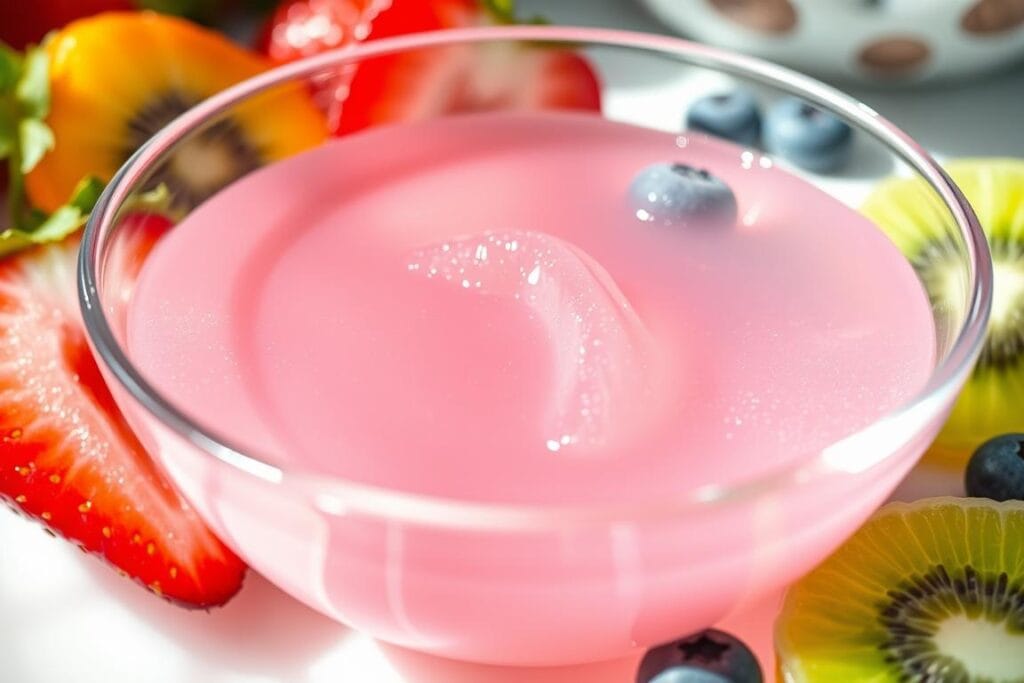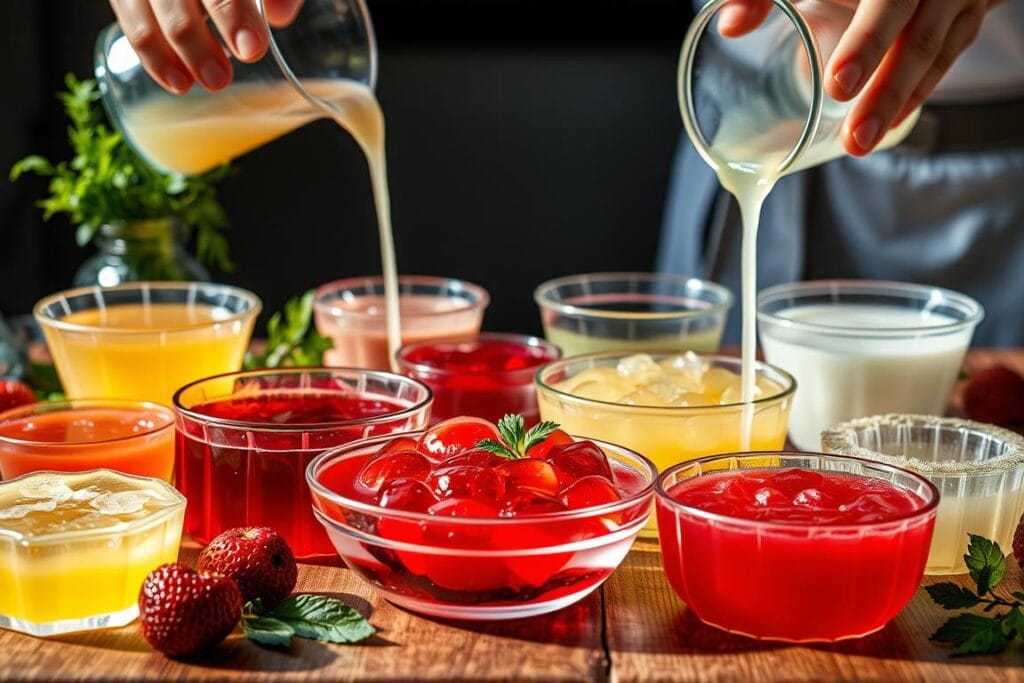
Ever craved vegan soup dumplings but worried about gelatin? The food world is changing. Now, we have plant-based options that taste like the real thing but are better for our diets.
Gelatin is key in many dishes, giving them a special texture. But for those who don’t eat meat, it’s a big problem. Luckily, new ways to cook and ingredients like agar agar are making vegan dumplings just as good.
Now, we can make vegan Chinese dumplings that are just as tasty as the originals. This is thanks to creative ingredients and cooking methods.
Key Takeaways
- Gelatin is not vegan-friendly due to animal origins
- Plant-based alternatives can successfully replace traditional gelatin
- Agar agar is an excellent substitute in soup dumplings
- Vegan dumpling recipes offer rich, complex flavors
- Culinary innovation makes plant-based cooking more accessible
Understanding Gelatin: Origins and Uses in Food Production
Gelatin has a rich history in cooking, adding texture to many foods. You might find it in your favorite treats without knowing it.

What Exactly is Gelatin Made From?
Gelatin comes from animal collagen, made from bones, skin, and connective tissues. It’s key for making veggie-stuffed or dairy-free dumplings.
- Derived from cow or pig parts
- Extracted through boiling and processing
- Transforms into a protein-rich substance
Common Foods Containing Gelatin
Gelatin is in many foods, often unseen by us. Your kitchen probably has items with it.
| Product Category | Common Gelatin-Containing Items |
|---|---|
| Sweets | Marshmallows, Gummy Candies |
| Breakfast | Frosted Cereals |
| Desserts | Puddings, Jellies |
Why Gelatin isn’t Vegan-Friendly
Gelatin is a big problem for vegans making meatless soup dumplings. It comes from animals, so vegans can’t use it. They must find other ingredients to get the right texture.
“Understanding ingredient origins empowers culinary creativity and dietary consciousness.”
Knowing about gelatin helps you cook better, whether you’re making traditional dishes or vegan ones.
The Role of Gelatin in Cooking and Food Texture
Gelatin is key in making unique textures for many dishes, like vegan dim sum and cruelty-free dumplings. It changes ingredients in amazing ways, adding structure and consistency. This is important for dishes that need a specific feel in your mouth.

Working with veggie dumplings means knowing how gelatin works. This protein ingredient mixes with water and holds ingredients together. It makes foods have a special bounce and chewiness.
“Texture is the secret weapon of extraordinary cuisine” – Culinary Experts
Gelatin’s main roles in cooking are:
- Creating smooth, consistent textures
- Binding ingredients without adding flavor
- Providing structure in no-bake desserts
- Creating gel-like textures in dishes
Professional chefs use gelatin to make amazing dishes. They know how it works at a molecular level. This lets them control textures in both old and new recipes.
| Culinary Application | Gelatin’s Role | Texture Result |
|---|---|---|
| Soup Dumplings | Binding Liquid | Juicy, Cohesive Filling |
| Desserts | Structural Support | Firm, Smooth Consistency |
| Savory Dishes | Moisture Retention | Enhanced Mouthfeel |
Whether making cruelty-free dumplings or trying new vegan dim sum, gelatin is essential. It makes your dishes better.
Agar Agar: The Leading Plant-Based Gelatin Alternative
Finding a great vegan substitute for gelatin can change your cooking. It’s perfect for making vegan soup dumplings or plant-based dumplings. Agar agar is a standout ingredient for those looking for plant-based options in Asian dishes.
Agar agar comes from red algae. It’s a game-changer for vegan Chinese dumplings and other dishes. This seaweed-based product makes a firm, clear gel that sets fast, without needing the fridge.
Exploring Agar Agar’s Culinary Potentials
Agar agar is versatile in making tasty textures. Here are some tips for using it:
- Available in powder, flakes, bar, or sheet forms
- Dissolves easily in hot liquids
- Sets at room temperature within 60 minutes
- Creates firmer texture compared to traditional gelatin
Conversion Ratios and Cooking Tips
| Agar Agar Form | Replacement Ratio |
|---|---|
| Powdered Agar Agar | 1:1 replacement for gelatin |
| Agar Agar Flakes | 1 tablespoon flakes = 1 teaspoon powder |
Agar agar is great for vegan soup dumplings. It acts like gelatin but is vegan. It also keeps your dumplings tasting and feeling like the real thing.
Pro tip: Always dissolve agar agar in hot liquid to activate its gelling properties effectively!
Agar agar is perfect for making vegan Chinese dumplings or trying new recipes. It’s a reliable, animal-friendly choice that makes your dishes better.
Natural Plant-Based Thickeners: Pectin and Carrageenan
Creating delicious meat-free dumplings and vegetable-stuffed dumplings requires understanding powerful plant-based thickeners. Pectin and carrageenan are exceptional alternatives for crafting dairy-free dumplings with perfect texture and consistency.
Pectin is a remarkable natural thickener from fruit cell walls. It transforms recipes into gel-like substances when heated with acids and sugars. Chefs love vegetable-stuffed dumplings for pectin’s ability to bind ingredients seamlessly.
- Pectin originates from fruit cell walls
- Creates smooth gel consistency
- Works perfectly in meat-free dumplings
- Requires specific heating conditions
Carrageenan, extracted from red seaweed, is another incredible thickening solution. Known as Irish moss, it develops a soft gel when boiled. This makes it ideal for dairy-free dumplings that demand precise texture.
| Thickener | Source | Texture | Best Use |
|---|---|---|---|
| Pectin | Fruit cell walls | Firm gel | Meat-free dumpling fillings |
| Carrageenan | Red seaweed | Soft gel | Smooth dairy-free dumpling textures |
Pro tip: Experiment with pectin and carrageenan ratios to achieve your desired dumpling consistency!
“Plant-based thickeners revolutionize vegan cooking, giving chefs unlimited creative freedom.” – Culinary Innovation Magazine
Vegan Soup Dumplings and Other Asian Cuisine Applications
Exploring vegan soup dumplings is a fun culinary journey for those who love vegan food. Asian cuisine is full of plant-based treats, with vegan dumplings becoming a favorite. They offer a kinder alternative to traditional dumplings.
Reimagining Traditional Dumpling Techniques
Vegan dim sum has changed cooking by introducing new plant-based binders. Chefs now make tasty dumplings using animal-free methods. They keep the classic taste but avoid animal products.
- Use agar agar as a main binder
- Try carrageenan for better texture
- Add vegetable thickeners
Mastering Texture in Plant-Based Dumplings
Getting the right texture is key. It’s all about mixing ingredients well. You need to balance moisture, binding, and feel in your mouth.
The art of vegan dumpling making is about creativity and precision in ingredient selection.
Ingredient Optimization Strategies
When making vegan soup dumplings, remember these important points:
- Choose high-protein veggies like tofu or tempeh
- Add mushrooms for a rich flavor
- Play with different binding ratios
Vegan dim sum is becoming more popular. Chefs are getting creative with new ingredients. This way, you can make vegan dumplings that are just as good as the traditional ones.
For more innovative vegan recipes, take a look at the variety of dishes on Alex’s Recipes, showcasing how plant-based cooking is being elevated to new heights.
Modern Commercial Gelatin Alternatives
The food industry has made big changes with plant-based ingredients. Now, there are new products for making veggie and vegan dumplings. These products change how we make our food.
New companies are making special gelatin substitutes. They work just like traditional gelatin but are plant-based. These products give veggie dumplings a great texture and feel.
- Vegan Jel products with vegetable gum
- Carrageenan-based binding agents
- Tapioca dextrin alternatives
- Specialized food technology proteins
Experts in food technology are creating proteins that act like gelatin. Geltor, a leading research company, is making proteins that are animal-free. This is a big step forward.
| Alternative | Primary Ingredient | Best Used In |
|---|---|---|
| Vegan Jel | Vegetable Gum | Desserts, Soups |
| Carrageenan | Seaweed Extract | Dairy Alternatives |
| Tapioca Dextrin | Cassava Root | Baked Goods |
“Innovation transforms dietary restrictions into culinary opportunities.” – Food Technology Experts
These new products let you make tasty plant-based dumplings. You don’t have to give up on taste or texture. This opens up new possibilities for vegan cooking.
Starch-Based Solutions: Cornstarch, Arrowroot, and Tapioca
When making vegan chinese dumplings, knowing about starch-based thickeners is key. These ingredients help bind and make meat-free dumplings consistent. They are great for home cooks.
Starch-based solutions add special qualities to vegetable-stuffed dumplings. Each one brings its own unique touch to your dishes.
Properties and Culinary Applications
Different starches have their own benefits in vegan cooking:
- Cornstarch: Great for thickening sauces and making smooth textures
- Arrowroot: Perfect for fruit dishes and clear glazes
- Tapioca: Gives a glossy, clear look in recipes
Conversion Guidelines
Here are some tips for swapping starches in recipes:
- Begin with a 1:1 ratio
- Adjust the liquid as needed
- Mix starch with cold liquid before adding to hot mixtures
Pro tip: Each starch is different. Experiment to find the best way to make vegan chinese dumplings!
Potato starch is a great substitute for cornstarch. It has similar properties but tastes neutral. People with corn allergies can use potato starch without issues.
These starch solutions are perfect for making delicate meat-free dumplings. They also help in plant-based cooking. They make your vegetable-stuffed dumplings reliable and tasty.
Gums and Specialized Vegan Gelling Agents
When making dairy-free dumplings or trying meatless soup dumplings, vegan gelling agents are key. Xanthan gum and guar gum are great for home cooks looking for plant-based binding solutions.
Xanthan gum, made from sugar fermentation, makes vegan dim sum recipes better. It gives them great texture and stability. You only need half the amount of traditional gelatin.
- Xanthan gum requires minimal quantities for maximum thickening
- Guar gum effectively stabilizes liquids in plant-based recipes
- These agents work brilliantly in gluten-free cooking environments
Guar gum, from guar beans, thickens well. Just half a teaspoon can change one cup of liquid. It’s a must for vegan cooking.
“Vegan gelling agents are game-changers in modern plant-based cooking” – Culinary Innovation Magazine
The demand for natural food products is growing. This is pushing the development of new gelling technologies. These plant-based options help with dietary needs and support sustainable cooking.
Conclusion
The world of cruelty-free dumplings has changed a lot. Now, you can find amazing vegan soup dumplings. These dishes show that plant-based food can be tasty and healthy.
Exploring alternatives like agar-agar lets you make dishes that are both tasty and good for you. This opens up new ways to enjoy food without giving up on what you believe in.
Today, people who care about their health have many options for veggie dumplings. These dumplings are low in fat and have no cholesterol. Ingredients like mushrooms, tofu, and vegetable broths add great flavor without losing the dumpling’s essence.
The rise of plant-based meat alternatives makes it easy to make classic dishes in a new way. This is good for both your health and the planet.
When you make vegan soup dumplings, you enter a world of creativity. Learning how to use agar-agar and steam properly is key. This way, you can make delicious plant-based dumplings.
The world of food is always changing, and it’s getting better for everyone. Your choice to eat plant-based is not just about food. It’s a choice for a healthier, more sustainable life.
If you’re interested in exploring more revolutionary recipes and techniques, head over to Alex’s Recipes for inspiration.
